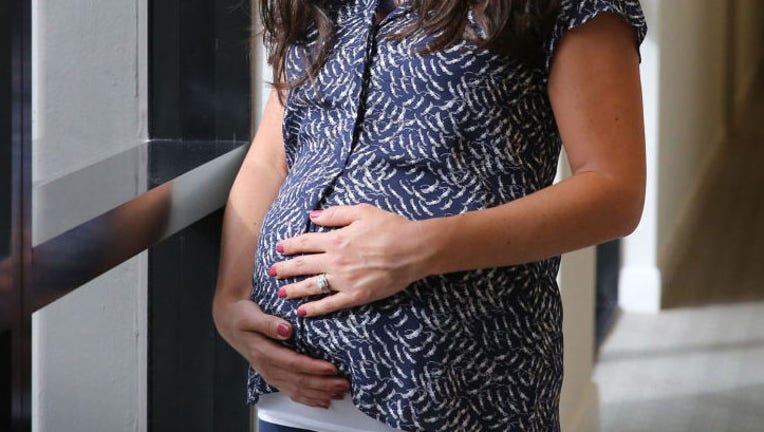COVID-19 may make common pregnancy complications worse, study suggests

FILE - A pregnant woman is shown in this file image taken on Aug. 3, 2016. (Emily Michot/Miami Herald/Tribune News Service via Getty Images)
Pregnant women with COVID-19 may be at a greater risk for common pregnancy complications that progress to something even more serious, according to a newly-published nationwide study.
Complications during any pregnancy are common, including the development of high blood pressure or having other infections beyond COVID-19. And while the overall risks are low, it’s also known that pregnant individuals are at an increased risk for severe COVID-19, compared to non-pregnant women.
The study, led by maternal-fetal medicine specialist Dr. Torri Metz at the University of Utah, aimed to expand on this research and found that pregnant individuals with COVID-19 were overall more likely to develop serious complications or die during pregnancy than those who weren’t infected.
Metz said the research adds how "people who have SARS-CoV-2 really are at an increased risk of having those common complications progress to something more that can be life-threatening or really serious morbidity."
Mild or asymptomatic infection was not significantly associated with increased pregnancy risks.
The researchers analyzed medical records of more than 14,000 pregnant individuals treated at 17 hospitals across the U.S. About 2,350 of these women tested positive for COVID-19 during pregnancy or within six weeks of delivery. The data was collected between March 1, 2020, and Dec. 31, 2020 — before the widespread availability of vaccination, some treatments and before the delta variant took hold.
"We don’t know well how the different variants are affecting the risks," Metz said in a Q&A on Monday, noting how the majority of the study involves data collected prior to the emergence of the delta variant and long before the omicron strain.
"I think future certainly work could also look at the different variants, how those different variants specifically affect the pregnancy and the placenta to really get at this in more detail," Metz added.
But Metz, who also serves as associate professor of obstetrics and gynecology at the university, added that the findings only bolster the rationale for pregnant people to get the COVID-19 vaccine.
"The complications of pregnancy we observed were mostly in people who had moderate to severe symptoms of COVID-19," Metz said. "We know from other studies that vaccination prevents the most severe symptoms of the disease. So, this is just another piece of the puzzle that should encourage pregnant people to get vaccinated."
The study was published on Feb. 7 in the Journal of the American Medical Association (JAMA) and funded by the National Institutes of Health.
Complications more prevalent with moderate or worse COVID-19
The team found that compared to those who had mild, flu-like symptoms or were asymptomatic, pregnant women who had moderate or severe COVID-19 — requiring treatment with supplemental oxygen or ICU care — were about three times more likely to have serious pregnancy complications.
Such problems included eclampsia, severe high blood pressure, kidney failure and other organ damage caused by high blood pressure, sepsis from infections other than COVID-19 and endometritis, the researchers said.
Pregnant patients with certain characteristics more likely to have complications
Pregnant women who tested positive and subsequently developed pregnancy complications were more likely to have a body mass index (BMI) of 30 or higher and identify as Hispanic or Black. Metz said these findings were in line with other demographic research among non-pregnant patients infected with the virus.
Pregnant individuals who had moderate or severe COVID-19 symptoms were also at a significantly higher risk of cesarean birth (45.4% vs. 32.4%) than those without the virus. However, c-section rates were similar among those who had mild symptoms or were asymptomatic, compared with those without the virus.
"Some pregnant individuals who have COVID-19 are just too sick for us to attempt a vaginal birth," Metz said. "In certain circumstances, such as the onset of preeclampsia, the fetus is also far less likely to tolerate it."
COVID-19 and worsening pregnancy complications: More research needed
The study was so large to enable the team to look for the progression of pregnancy complications on a wide scale. While they found a possible link with certain forms of COVID-19, they still don’t know the reason.
Metz said it could be because SARS-CoV-2 itself can affect the placenta and may put people at higher risk of developing more severe complications like preeclampsia or high blood pressure, causing downstream consequences.
It could also be because COVID-19 patients may have delayed coming to the hospital, particularly since the study was designed early on in the pandemic. Or because there were delays in the hospital providing care to patients.
"A lot of these complications that we looked at are things that can evolve very rapidly in pregnancy, so any sort of delay could certainly put people at higher risk," she said. "Those are things we need to look into for sure."
This story was reported from Cincinnati.


